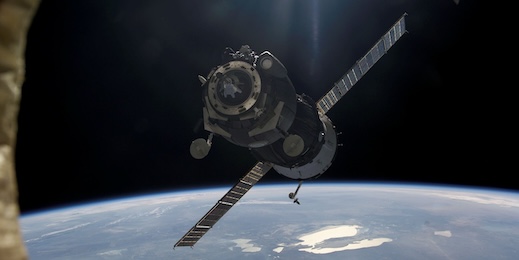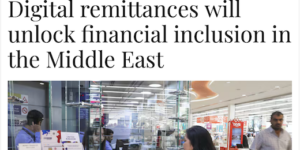The opinion piece titled “A GCC spaceport could bring galactic gains” was published in the Arabian Gulf Business Insight (AGBI) on 4th Jul 2024.
A slightly longer version of the article is posted below.
A GCC spaceport could bring galactic gains
It would support the development of the space economy in its multiple dimensions
The global commercial space economy is expected to grow, conservatively, to over $1.8 trillion by 2035 (from $630 bn in 2023) and become ubiquitous. As space technology costs rapidly decline, countries are developing space programs, investing in next generation launch vehicles (to land on the Moon and/ or Mars) and space exploration. Space transport and logistics systems, space-based production is becoming economical, and tourism more accessible [1]. Beyond spacecraft manufacturing (including launch vehicles), commercial space transportation and enabled industries [2], space technologies are integrated with day-to-day life. Such space-enabled activities are derived from three primary areas: Positioning, Navigation & Timing (PNT), Earth Observation (EO), and Satellite Communication & Connectivity (SatCom). In addition, worldwide government expenditures in space defence and security reached a historic high of over USD 58bn in 2023 and is accelerating in response to geopolitical fragmentation and Cold War II.
Space technologies support a growing proportion of earth-based activities ranging from day-to-day telecommunications or satellite-based internet connectivity in remote locations, GPS [3] for navigation (in cars or phones) to broadcasting (TV and radio via communications satellites). There are currently around 9,900 active satellites in various Earth orbits [4] – of these, 84% are located closer to earth (and are small satellites) and a large proportion are used to enable SatCom and EO.
The bottom line is that we are now increasingly space and satellite dependent. In 2001, only 14 nations operated satellites, but more than 90 now, driven by the reduction in the cost, size, weight, and power of satellites, with a larger number of smaller, distributed low-earth orbit satellites are being launched [5]. As the IoT becomes a reality, core earth-based infrastructure networks and systems – utilities, transportation, water, electricity, energy sources- will be increasing monitored, managed, integrated with and vulnerable to disruption from space (space wars are on the horizon!). Transport & logistics systems will become four-dimensional: land, water, air and space, and increasingly integrated. For the GCC space transportation – the movement of objects, such as satellites and vehicles carrying cargo, scientific payloads, or passengers, to, from, or in space – will complement their massive investments in air and sea transport and logistics infrastructure.
The GCC Space Race: why the GCC should develop a Spaceport
While the first Arab satellite (Arabsat) was launched in 1985, the UAE is rapidly developing its space activities. UAE is one of the original eight signatories of the Artemis Accords (a set of principles for exploration and conduct in space; Saudi and Bahrain signed these in 2022), it launched the Hope probe in 2020, sent the Rashid Rover to the Moon in 2022, with the next big project being a mission to the main asteroid belt between Mars and Jupiter.
The GCC are increasing their investments in the satellite industry (UAE’s Yahsat [6] , Qatar’s Es’hailSat satellite company) and developing and implementing space policies. Kuwait and Bahrain launched their first satellites in 2021, while Oman hosts a satellite monitoring station. Bahrain, Qatar, Saudi Arabia and the UAE have focused National Space Agencies. Oman announced its 10-year Policy and Executive Program in 2023 and a national space program.
Given the growing strategic importance of the space economy, the GCC should build a GCC-Spaceport from which satellites and spacecraft can be launched as part of their space strategies. Indeed, Oman recently announced plans to develop such a spaceport to be operational by 2030 [7].
Developing the space economy should be part of GCC economic diversification strategies and investment in new technologies. A WEF-McKinsey report [8] revealed that investments touched all-times highs of more than USD 70bn in 2021 and 2022. The report forecasts five sectors will generate 60% of the global space economy by 2035: (a) supply chain and transport with increased efficiency and cost-effectiveness via fleet management and supply-chain visibility; (b) food and beverage: supported by efficient last-mile delivery; (c) state-sponsored defence for surveillance; (d) retail, consumer and lifestyle, for online e-commerce services; and (e) digital communications for better connectivity.
Space exploration, space-based production and supply chains are rapidly growing. From a sustainability and climate monitoring standpoint, space-derived data is increasingly used in environmental monitoring (tracking biodiversity, managing natural resources, assessing the impact of disasters) and mitigating climate change risks (e.g. monitoring crop development, map deforestation due to mining projects). As climate change accelerates space-based applications include climate modelling (using AI), storm forecasting, precision farming, autonomous driving, the ability to identify and quantify emissions sources as well as space-based solar power plants. In financial services space uses range from risk modelling to inform insurance policies, to using geolocation to track harvests, flows of goods and impact trading markets. Satellite data can also be used to monitor compliance with the growing ESG market and “green finance” investments.
The GCC’s geographic proximity to the equator provides a comparative advantage for locating a spaceport, providing low escape velocity from Earth. The GCC are also a geopolitically neutral location/hub, providing a reliable partner for the global space industry and countries wanting to access space, amid growing geopolitical tensions.
The GCC Space Port would support the development of the space economy in its multiple dimensions in the GCC, support commercial launch and space located activities, complement their land-sea-air transport infrastructure networks, as well as protect their space related assets. The focus on commercial space activities would also be complemented by commercial space economy financing: providing finance for satellites, space launches and space related activities.
Satellites and networks are increasingly becoming geostrategic assets, with infrastructure (both earth-based, sub-space and space based) becoming vulnerable to disruption or attack. A GCC Spaceport is integral to national security, providing the infrastructure for the launch of satellites, space vehicles as well as missiles.
Footnotes:
[1] Virgin Galactic, Blue Origin, and SpaceX’s Crew Dragon spacecraft completed their first missions in 2021. Virgin Galactic and Blue Origin successfully completed seven revenue generating commercial flights (VG in early-Jun 2024). Tourism flights from SpaceX and Space Adventures, when launched, are expected to cost a fraction of the current amounts (a seat on a Virgin Galactic spacecraft is currently priced at about USD 450,000).
[2] Commercial space transportation and enabled industries include launch vehicle manufacturing and services industry, satellite manufacturing, ground equipment manufacturing, satellite services, satellite remote sensing, and distribution industries.
[3] GPS, or the Global Positioning Systems, were first designed by the US government as tools of war to guide missiles. Now, its public use is all around – we use it when exploring a new city or taking a car ride.
[5] On the downside, the large increase in space objects could become a risk to Earth’s orbit: in this regard, the Space Sustainability Rating initiative was launched to foster voluntary action by satellite operators to reduce the risk of space debris, on-orbit collisions, and unsustainable space operations.
[6] Recently signing an agreement for geostationary satellites with Musk’s SpaceX: https://www.agbi.com/tech/2024/07/yahsat-taps-musks-spacex-for-next-satellite-launches/
[8] https://www.weforum.org/publications/space-the-1-8-trillion-opportunity-for-global-economic-growth/








